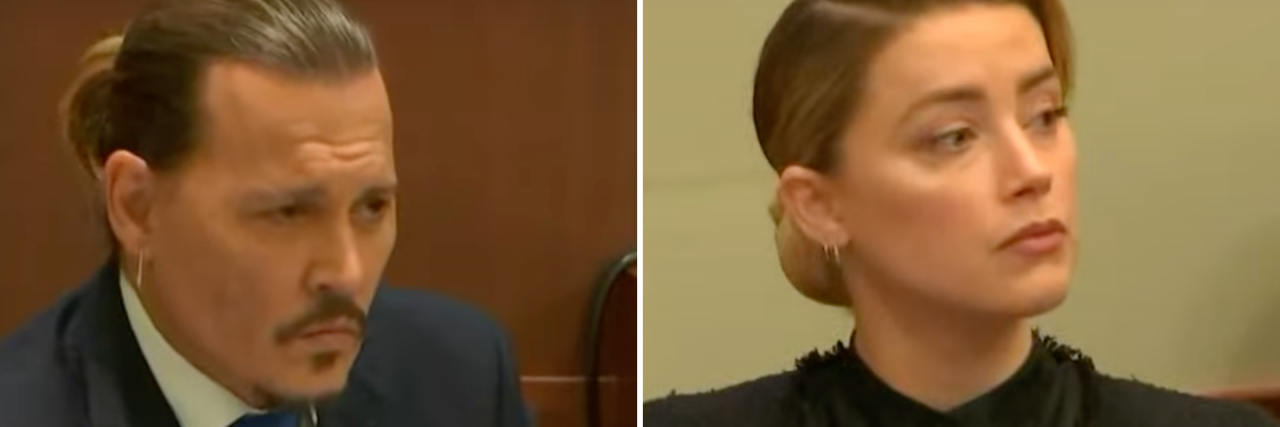'Mutual Abuse' Is a Trending Myth That Could Harm Abuse Victims
This is an opinion story.
The Mighty offers writers a platform to publish their perspectives on health-related topics. This story reflects the viewpoints of the writer alone. Feel free to contribute to the conversation in the comment section below.
Editor's Note
If you’ve experienced domestic violence, the following post could be potentially triggering. You can contact The National Domestic Violence Hotline online by selecting “chat now” or calling 1-800-799-7233.
“Mutual abuse” has been a trending term the past few days due to a highly publicized court battle between two A-List celebrities, Johnny Depp and Amber Heard.
ICYMI, Johnny Depp is currently pressing charges against Amber Heard for defamation due to what Amber Heard wrote in a Washington Post story in 2018.
Social media users have been intensely watching this situation unfold since it started back in 2016, and haven’t been shy in taking sides.
Recently, a therapist in defense of Amber Heard claimed they “mutually abused” one another. (Source: NBC News)
“Mutual abuse” as a term lacks a lot of nuance. Currently it’s being used as a means to describe the back and forth toxicity between Heard and Depp, specifically on Twitter.
Two people can be abusive towards one another, however mutual abuse as a term typically gets thrown around when one person (usually a victim or survivor) is speaking up against their abuser. (Souce: National Domestic Hotline)
This often looks like a victim/survivor coming forward about the abuse, and the abuser responding, “well they abused me too!” Sometimes there was reactive abuse, but sometimes this is an abuser’s attempt to control the narrative by shifting the blame to the victim. This is often used to weaken the victim’s argument, and can even lead to them not receiving justice.
Regardless of who you agree with in this public dispute, here’s three major reasons as to why “mutual abuse” isn’t a real thing.
1. There’s a difference between “mutual abuse” and “reactive abuse.”
“Reactive abuse” is when someone decides to fight back against their abuser. (Source: Dr. Betsy Usher)
If you get pushed into a wall, and you decide to push them back, that’s a reactive measure and self-defense. However, it could easily get mislabeled as, you guessed it, “mutual abuse.” This shifts the narrative and makes it harder for the person who is actually being abused.
People should be able to defend themselves without fear that said self advocating could lead to an abuse allegation of their own.
2. Abuse relies on a power imbalance.
A power imbalance can be caused by a myriad of different reasons. It could be intersectional and systemic (the closer to a white, cis, straight, able-bodied/minded person you are, the more systemic power you hold), as much as it could be due to finances, manipulation, ages, etc. An abusive relationship thrives on a party exerting power over another.
This isn’t to say someone who is marginalized or poor can’t be abusive. They 100% still can be, but abuse is based on a form of power imbalance where the scales tip on the side of one person more than another. For a couple to be mutually abusive, that means there’s a power imbalance on both sides, which is extremely rare. (Source: National Sexual Violence Resource Center)
3. Fighting back or defending yourself against your abuser isn’t abuse, and that line of thinking could endanger abuse victims.
Laws differ from state to state in regards to self-defense in domestic violence cases. We’ve seen people sent to jail for fighting back in situations of sexual assault, physical abuse, and more. To label self-defense against abuse as abuse itself puts the same people, who are already at a disadvantage due to the above mentioned power imbalance, in a potentially very dangerous situation. People can be mutually messy and toxic to one another, but calling self-defense “abuse” harms victims.
[pull quote] People should be able to defend themselves without fear that said self advocating could lead to an abuse allegation of their own.
I don’t know the truth behind what’s happened with the Depp Heard case, as it’s a very messy situation where abuse survivors all around are watching not only the results unfold, but also the responses from onlookers alike.
We have to be careful of the commentary we make when watching highly publicized domestic abuse court cases, as you never know who the survivors and victims in your life are. The way you respond may encourage them to speak up and get help, or it could push them further into silence, which oftentimes can be deadly.
UPDATED (4/28/22): The original piece was edited to include additional external sources.
Lead image courtesy of LiveNow from Fox’s YouTube channel

